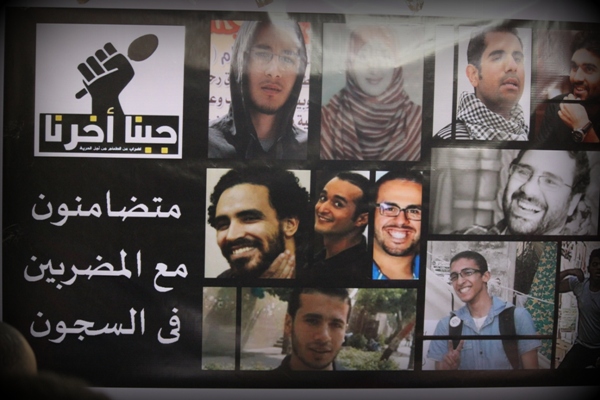Dozens join hunger strike for release of Egypt political prisoners

CAIRO, Sept 10 (Reuters) - Dozens of Egyptians have begun a hunger strike to demand the release of activist Alaa Abdel Fattah, a symbol of the 2011 uprising, and others they say are being unfairly detained in an effort to crush new-found freedoms.
An Egyptian court sentenced 33-year-old Abdel Fattah, a leading figure in the revolt that toppled Hosni Mubarak, to 15 years in jail in June for violating a law that seeks to curtail protests.
Twenty-four others were also sentenced to 15 years in jail on similar charges, though only Abdel Fattah and two others are currently behind bars.
The three in jail have been on hunger strike since Aug. 18.
At their retrial on Wednesday, the judge set Sept. 15 as the date of the next session after hearing prosecution evidence including family videos that outraged the defendants.
The prisoners, appearing in a court room cage, asked for jackets after complaining that the lack of food made them cold in the air conditioned court room.
Speaking at the court, Abdel Fattah's mother Laila Soueif said she went on hunger strike after losing faith in the courts.
"I do not trust the judiciary," she said. "I am relying entirely on public opinion."
Soueif said she and her daughter Mona, also a human rights activist, had begun their hunger strike on Aug. 28, as had her other daughter Sanaa, who is detained in a separate case.
Omar Robert Hamilton, an activist and relative of the family, said in an email to journalists that 65 other people, including fellow detainees, had also given up food as part of the Freedom for the Brave campaign.
The 15-year sentences were passed almost a year after then-army chief Abdel Fattah al-Sisi overthrew Egypt's first freely elected leader, Mohamed Mursi of the Muslim Brotherhood.
Since Mursi's ouster, security forces have rounded up thousands of Brotherhood supporters, and courts have sentenced hundreds to death in mass rulings that have drawn criticism from human rights groups and Western governments.
But Egypt's secular activists have also found themselves on the wrong side of the new regime.
The protest law, which was passed last year, gives the interior ministry the power to ban any public gathering of more than 10 people, and has added to fears that freedoms won during the uprising are being rolled back.
Those on strike include 19-year-old Yassin Mohammed, a student who was still a school boy when he joined the protests that toppled Mubarak. He sat in a shady corner of a cafe near the court with other activists before the hearing.
"They want to jail the largest number of revolutionaries. This is an oppressive regime that does not respect human rights," said Mohammed.
"I started my hunger strike on Aug. 31 to call for an end to the protest law and military trials against civilians and to call for the release and retrial of all political prisoners."
Abdel Fattah has been in and out of jail since 2011, missing the birth of his child and the death of his father Ahmed Seif al-Islam, one of Egypt's best-known human rights activists.
In a letter to the judges, Abdel Fattah asked to be freed on bail to be with his family in their time of grief after the court rejected a previous request for him to visit his father in hospital before his death. Abdel Fattah also asked the judges to step down and allow for a retrial.
"We have begun a hunger strike across the jails and outside them with the aim of pressuring the centre of political will... I am now in my fourth week of the strike," his letter read. (Editing by Raissa Kasolowsky)









facebook comments